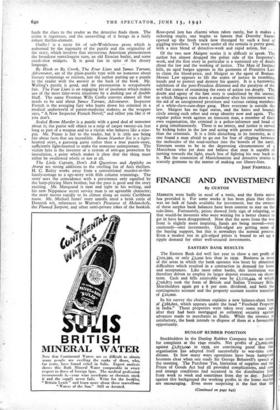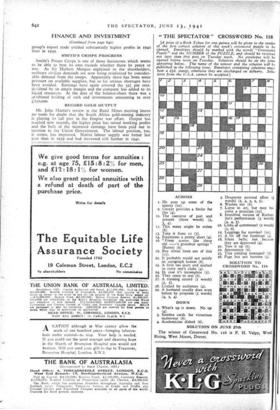FINANCE AND INVESTMENT
By CUSTOS
MARKETS were badly in need of a tonic, and the Syria move has provided it. For some weeks it has been plain that there was no lack of funds available for investment, but the owners of these surplus bank balances have been content to stay on the side-lines. Fortunately, prices showed little sign of relapsing, so that would-be investors who were waiting for a better chance to get in have been disappointed. Now that the news from the war front is slightly more inspiring, funds are being moved—very cautiously—into investments. Gilt-edged are getting most of the buying support, but this is nowadays the normal process. Even a modest rise in gilt-edged prices is bound to set up a ripple demand for other well-secured investments.
EASTERN BANK RESULTS
The Eastern Bank did well last year to show a net profit of £102,390, or only £2,000 less than in 1939. Business in most of the areas in which the bank operates was beset by abnormal difficulties which resulted in a contraction in demand for loans and acceptances. Like most other banks, this institution was therefore driven to employ its larger deposit resources on short- term. Cash and bills receivable rose by £1,122,444, of which £706,875 took the form of British and Indian Treasury Bills. Shareholders again get a 6 per cent. dividend, and both the contingencies account and the property account receive transfers of £20,000.
In his survey the chairman explains a new balance-sheet item of £286,6o1, which appears under the head " Freehold Property in India." These properties were taken over some years ago after they had been mortgaged as collateral security against advances made to merchants in India. While the revenue is satisfactory, the bank intends to dispose of them at a favourable opportunity.
DUNLOP RUBBER POSITION
Stockholders in the Dunlop Rubber Company have no cause for complaint at the 1940 results. Net profits of £3,002,000, against £2,853,o0p in 1939, are convincing proof that this organisation has adapted itself successfully to war-time con- ditions. In how many ways operations have been hampered becomes clear when one reads Sir George Beharrell's speech at the meeting. The Purchase Tax, limitation of supplies and the Prices of Goods Act had all provided complications, and new and strange conditions had occurred in the distributive field from week to week and sometimes from day to day. Judged against this background the working profits in the home market are encouraging. Even more surprising is the fact that the
(Continued on page 642)
FINANCE AND INVESTMENT
(Continued from page 64o) group's export trade yielded substantially higher profits in 1940 than in 1939.
SMITH'S CRISPS PROGRESS Smith's Potato Crisps is one of those businesses which seems to be able to beat its own records whether there be peace or war. As Sir Herbert Morgan explained to the shareholders, ordinary civilian demands are now being reinforced by consider- able demand from the troops. Apparently there has been some pressure on available supplies, but so far serious shortages have been avoided. Earnings have again covered the 32-1 per cent. dividend by an ample margin and the company has added to its liquid resources. At the date of the balance-sheet there was a cx mbined holding of cash and investments amounting to over £250,000.
RECORD GOLD OUTPUT Mr. John Martin's review at the Rand Mines meeting leaves no room for doubt that the South Africa gold-mining industry is playing its full part in the Empire war effort. Output has reached new records, the higher price has raised working profits and the bulk of the increased earnings have been paid out in taxation to the Union Government. The labour position, too, it seems, has improved. Native labour supply was better last year than in 1939 and had increased still further in 1941.



























 Previous page
Previous page